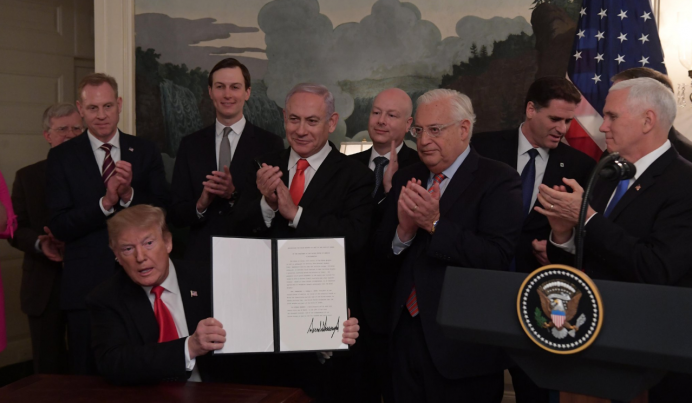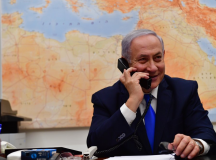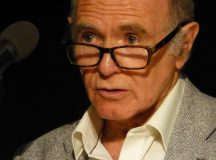In late February, David Makovsky and Dennis Ross spoke at a BICOM/RUSI event in London about their upcoming book, Be Strong and of Good Courage: How Israel’s Most Important Leaders Shaped Its Destiny, and assessed the prospects for the looming Trump peace plan. Both Makovsky and Ross have many years of experience in Middle East peace-making. In 2013-2014, Makovsky worked in the Office of the US Secretary of State John Kerry as a senior advisor to the Special Envoy for Israeli-Palestinian Negotiations. Ross has played a leading role in shaping US involvement in the Middle East peace process and was US point man on the peace process in both the George H. W. Bush and Bill Clinton administrations. Download a PDF version here.
David Makovsky: ‘For now, we need a less ambitious Plan B, not a high stakes gamble’
During the 1990s the Oslo process tried to deal with the four core issues standing in the way of peace: borders, security arrangements, refugees and Jerusalem. A fifth issue later emerged during the Kerry negotiations in 2013-14: mutual recognition.
From 1993 to 2000 the peace process had been an incremental one; after all, the Palestinians had not yet prepared the groundwork for statehood. Final-status discussions though, were always envisaged.
President Clinton’s effort at Camp David in 2000 was the first of three attempts by the US to put incrementalism aside. The other two attempts were the Annapolis Process in 2007-08 and the negotiations which I was part of in 2013-14 under then-Secretary of State John Kerry. All failed. Since then, there has been a ‘deep freeze’.
The Trump Plan
The details of President Donald Trump’s peace plan are very closely guarded and so we are all at a disadvantage. Despite this, many media reports concur about the kind of ideas that form the basis of the plan. It seems likely to be a ‘Clinton Parameters minus’ plan, or perhaps an ‘Economy plus-plus’ plan.
There are two factors to consider with Trump’s plan. The President is a controversial figure in his own right, and he believes that this is the ‘Deal of the Century,’ the ultimate deal and one he wants to make. There is also a belief that a strategic convergence between Israel and the Gulf States is beneficial for all parties when it comes to confronting Iran. So there is a tendency to think that there is an opportunity to drive Israeli-Palestinian peace talks forward via an ‘outside-in’ approach.
As for timing, there are some logistical dimensions to consider. Passover falls on 22 April and Ramadan between 4 May and 10 June, but I believe the administration will go forward with the plan somewhere in that April-June period, following the Israeli elections on 9 April. I assume this will not happen during Passover or Ramadan, and if it is not presented by the summer, then the 2020 American presidential election cycle will begin after Labour Day in September. So, I am inclined to believe that it is coming soon.
The lack of a ZOPA (Zone of Possible Agreement)
What I experienced during the Kerry negotiations was that there was no cross over between the positions of Benjamin Netanyahu and Mahmoud Abbas. I fear that is still the case. On borders, security arrangements, refugees, Jerusalem and mutual recognition, there is no ZOPA for a final-status agreement and that makes me nervous.
I worry that every time the US fails, it undercuts the country’s ability to make an impact moving forward. Failure is not neutral but comes at a cost. That’s why I believe it would be better for us to advocate a less ambitious ‘Plan B’ which avoids addressing final status issues until the political climate is more accommodating, and until we have leaders who are more prepared for a grand deal. I would rather see something more modest such as an Israeli commitment to stop building outside the security barrier and perhaps transferring some of Area C to the Palestinian Authority (PA). Israel could probably transfer an additional 25-30 per cent of Area C without moving settlements. This would signal a move in a particular direction (towards two states), even if it does not reach the final destination. It would be preferable to a high stakes gamble, which in my view has a low probability of working.
Abbas cannot wait to say no to the Trump administration, and Netanyahu will count on Abbas to reject the proposals and then praise Trump for his efforts. He will say he is going to give the proposals serious consideration and is willing to meet Abbas at any time and any place apart from during Shabbat. I am a bit worried therefore that the Trump plan is set up for failure.
Dennis Ross: ‘The most we can hope for right now is to recreate a sense of possibility, which has been completely lost’
Peace and the Arab States
When the Trump administration was sworn in, a theory was circulated that due to the strategic convergence of key Sunni Arab leaders and Israel over the threat posed by both Iran and radical Sunni Arab Islamists, there was a new basis on which to pursue peace, and either side-line the Palestinians or subsume them under ‘the Arabs’.
For those of us who have been involved in the region for a long time, but who are always ready to question our assumptions, we have also seen a new potential for peace, but not in the way it is portrayed in that theory. Firstly, Arab leaders will never publicly say that the leaders of the Palestinian community need to accept something. Secondly, they will never publicly praise the plan and accept it if the Palestinians will not. Now that is not to say that this is not something, that there is nothing to be done. The Arabs are needed for cover by both sides. The Palestinians believe they are the weakest party, the victim, and they are owed. So they need a cover. But so does the Israeli government because almost nobody in Israel believes that if you make concession to the Palestinians you will get something in return. The Left, which makes up maybe five per cent of the country – and I mean the real Left – may believe this, but the rest of the country does not. The result is that the only way you can justify making significant concessions to the Palestinians in Israel is to point to what you are gaining from the Arabs in return.
So there is an Arab role to play and there is a new circumstance, but you have to understand what is within the realm of possibility. I think the US administration has come to understand that the most you can get from Arab leaders is for them to believe and to state publicly that the plan is a basis for negotiations. Then we could approach the Europeans, who would not be ‘more Arab’ than the Arabs, and at that point Abbas would be in a position where it would be difficult for him not to come back to the negotiating table. The Palestinians do not view the PA as a great achievement, but they do view the international acceptance of their cause as one, so it would be very hard for them to put that at risk by saying ‘no’ to the plan if it was accepted by most stakeholders.
The question is how do you move the Arabs to a position whereby they accept the Trump plan as a basis for talks? Substance and process are equally important in producing Arab approval. If the plan does not provide for a clear and obvious Palestinian state, with a significant part of Arab East Jerusalem as its capital, then there is little chance the Arabs will accept it. By the way, places such as Beit Hanina and Shuafat do not count, as they were not part of Jordanian Jerusalem. It is important the plan is aware of where the municipal boundaries were prior to the 1967 conflict. They would probably also want some kind of corridor to the Haram al-Sharif. If these two factors are there – a state and a capital in Arab East Jerusalem – then the Palestinians will not squabble on the security issue, because frankly, most of them are counting on Israel. They do not think they can count on the US as they see Trump supports – just as Obama did, albeit with a different tone – the US no longer being in the Middle East.
There is an interesting convergence occurring between Israel and Arab states, though one should not misread what it can actually produce by way of an outcome with Israelis and the Palestinians. Despite this convergence, the substance remains important: a state and a capital including a significant part of East Jerusalem.
To get a positive response to the plan, the administration should have been creating an environment to encourage that response. It is hard to say it has done that. The Palestinians feel alienated and believe that every move the administration has made has been designed to punish them. If you are seeking to show that you care about the Palestinian people and their suffering, it cannot just be done by a declaration, you have to demonstrate it.
The Economics of Peace
On the economic dimensions of the plan, you cannot cajole Gulf States into pledging large amounts of money without a sign that the administration is prepared to do the same. Even in that scenario, it will not be a simple proposition. It goes back to the question of how you prepare the Arabs for what’s coming? At a certain point, they will need to be presented with a document and be allowed to make some changes to it. The Arab response upon the public presentation of the plan will also have to be negotiated, word for word. Once that has been achieved, you can approach Europe.
Will the administration be able reach a threshold where the proposals are substantive enough? I do not know. Will they be able to orchestrate the process in the right way? I do not know. I do think the people working on this plan are genuinely serious. I have asked them how they define success and they replied: resuming diplomacy and negotiations on this basis. If this is how they define success, then in my mind, it is not too late for them to adopt what I have described. It will require orchestration with the Saudis, Emiratis, Egyptians, Jordanians and Moroccans. To produce a ledger of support such as this will not be easy, and it will be harder than it has been before. I do not think it is impossible, but I would focus heavily on what can be achieved on the ground.
Israel’s Fateful Choice
Ross: There is a fateful choice facing Israel because of the demographic issue. What needs to be done, without jeopardising Israel’s security, is the following.
Firstly, stop building to the east of the barrier, which would preserve the option of separation and a two state outcome. If you keep building to the east of the barrier and outside the blocks, then you reach a tipping point, and I don’t know exactly where it lies, where you can no longer separate Israel and what might have been a Palestinian state. At this point, you’ve adopted the historical aim of the PLO, which is a bi-national, secular and democratic state, which would be a strange irony indeed.
Secondly, declare that there will be no Israeli sovereignty east of the barrier. Say Israel will retain overriding responsibility for security, but also say there will be no building in the Arab neighbourhoods of East Jerusalem; again, to preserve separation.
Thirdly, provide financial incentives for those who live outside the blocks to move back. Allow the Palestinians to operate economically in Area C, which is their economic hinterland. I do not envisage big industrial zones or a phosphate plant. However, the World Bank says that simply allowing greater freedom to operating economically could result in a 35 per cent increase in their GDP. They can be given access to the agricultural and industrial markets, or from the tourism standpoint, be able to operate on the Dead Sea and additionally make use of the minerals there, without having to necessarily designate parts of Area C into Area B.
Makovsky: We do think there is a sense of urgency here. There are over 100,000 Israeli settlers who are east of the barrier and there will soon come a tipping point when there is no turning back.
We know people think these problems are too big and the leaders too small. So we have to inspire people and let them know that there were leaders who once rose to the historic occasion, were willing to confront their own constituencies, and exhibited profound political courage in reaching the decision that they did.
Because of this culture of disbelief however – the scepticism and even downright cynicism which has affected both sides – people need to remember that there were leaders who did rise to a historic occasion.
Ross: In the last chapter of our book we try to draw lessons from the past and see if we can apply them to the future. We draw up four biographical profiles on leaders: David Ben-Gurion, Menachem Begin, Yitzhak Rabin and Ariel Sharon; who they were, how they evolved and how they came to confront the big issues, take decisions and act. For them, being responsible was the test of being a leader. In three of the four cases, the US provided significant assurances and commitments which made it easier politically for those leaders to take on their own constituencies, because they also had something else to show for it.
I will conclude by addressing a remark made by Jared Kushner in Warsaw. He said that there are economic and political components to the plan. The economic aspect, devoid of a political component, will not be taken seriously. However, the political without the economic will not be sustainable, nor produce any change.
We began this process 26 years ago and both sides have lost faith. That is a challenge that any initiative faces, but we have not lost confidence that we can achieve a negotiated solution. Any initiative must produce something tangible on the ground, not because this will fix any problem, but when you lose faith, everyone needs a reason to take a second look. The most we can hope for right now is to recreate a sense of possibility, which has been completely lost. We do not need another initiative that confirms nothing is possible and ends in failure. That will only deepen cynicism and disbelief, pushing us further away from what needs to be done.
Correct sequencing
Ross: The Administration has no relations with the Palestinian authorities, so they won’t be presenting the plan to those authorities first. This is a double-edged sword because there is a high probability that if you propose it first to the Palestinians then they will go to the Arabs and tell them to reject the plan because it’s a betrayal of the Palestinian cause.
Makovsky: It is sometimes worth noting the sequencing that the Administration is adopting with the Arab states is to focus on economics first because they believe that the ultra-sensitive issues are non-economic, such as Jerusalem, borders, refugees, etc. And Netanyahu is nervous that a leak from an Arab capital will impact his election. My assumption is that now the Israeli elections are behind us, there will be a second round with the Arab states, especially as the Arab states will be expected to pay for some of it.
During my time on the Kerry team, in February 2014, Kerry met with Arab League foreign ministers to attempt to outline what our framework was going to be. At one point, the Saudi foreign minister said ‘you’ve consulted enough just do it’. Then, the word got out that the Arabs liked Kerry’s plan but Abbas did not like the fact of mutual recognition / Jewish State and he demanded an emergency meeting of the Arab League in Kuwait city. Within a week of the meeting, those same Arab League foreign ministers who agreed to Kerry’s plan pulled a complete 180 degrees after consultation. Consultation is necessary but I’m not quite sure if it is sufficient because being a part of this reinforced the reality that there are no guarantees.
Ross: In terms of commitments, it is only the Arab leaders (rather than Arab foreign ministers) who count for anything. In the past, if Arab leaders gave you their word on something, which was not easy to acquire, they would follow through on it. So, this plan cannot just be presented to foreign ministers, but must also go to the Arab leaders, and we must be prepared to spend serious time with them, reviewing the plan and flagging the issues that they think their country’s public are likely to be more sensitive to. If this happens, then I have more of an expectation that something will happen. My fear is that the orchestration will not be as well done as it needs to be and the content will fall short. Part of the reason that they would back away would be if they can’t stand up and admit that this is serious. The Arab states focus heavily on key symbols – and chief among these symbols are statehood and Jerusalem.
Abbas aside, the sequence you choose with the Arabs can be highly problematic. The administration is using a different paradigm – not just the economic component of this issue (which is not new). They believe that past efforts failed in part because even the most developed ones were still essentially principles for how to resolve the issues, with parties then negotiating how you would actually shape those principles in practice. They have prepared a 50 page document designed to spell out what each of these areas would look like, which is very ambitious. If you are not taking full advantage of some of the resources within the administration however – and there are people who know these issues inside and out – then you’re still not reaching into the bureaucracy in a way that would be more helpful to them.
Makovsky: It will be interesting how the media interprets this 50 page document because they want to tell it like a story. This is not an ‘Oslo-framework’ legal, contract type document. Rather, it is a narrative that people will be able to absorb. For example, if the administration is going to roll this out, perhaps it can restore some aid to East Jerusalem Hospitals? Wouldn’t it be wrth addressing the vague tweets of the president when he says, ‘I’ve taken Jerusalem off the table’? If you are a Palestinian and you see these off-hand tweets, you will make the conclusion based on the worst-case scenario.
Are the Israeli and Palestinian publics are ready for peace?
Makovsky: I tend to think that Netanyahu identifies that the public does not believe peace is attainable tomorrow. Instead of people having aspirations, they have fears. Both sides focus on their fears more than on their hopes. The fear on the Right is that if you have a Palestinian state then you will be bringing Hamas into the middle of Israel and this will be hell on earth. The fear on the centre/centre-Left is that if you have occupation this will erode the fundamental character of Israel as a democratic and Jewish state. Each side is more focused on their fears than their hopes and I think that Netanyahu helped create that in a certain way, as did Abbas. So this is a different kind of dynamic. Our book is not about eliminating the conflict but shrinking the conflict, which we think it is more realistic.
Ross: The concept of what makes a conflict ripe is a mutually hurting stalemate. In Northern Ireland, each side got to the point where they agreed that the cost was too high. Now, does this exist today? No. It does not. For a lot of Israelis, the risk of a Palestinian state is not just about Hamas being in the West Bank. Given the lack of institution building on the Palestinian side, which is nobody’s fault, the prospect of a failed state coming into being is quite high. A failed state may not equate simply to Hamas, but it might also mean an ISIS affiliate gains prominence. If you’re an Israeli, you see this, but it is not the only thing you see. They have seen how the conflicts in Iraq and Syria have played out. Now you have Iran and Shia militias embedding themselves, attempts to build a kind of land corridor, which Israel is trying to prevent, along with precision guided missiles and very sophisticated air defence systems. The Israeli public sees this, knowing too, that ISIS affiliates are in the Sinai, and Hamas are in Gaza.
When Israelis look at this array, they don’t think it is the time to take a risk, resulting in the opposite of a mutually-hurting stalemate. On the Palestinian side, they are hurting, but they also have no faith in their own leadership. If there were to be elections in the West Bank, there is a decent chance that Hamas would win. But if you had honest, fair elections in Gaza, Hamas wouldn’t win.





































